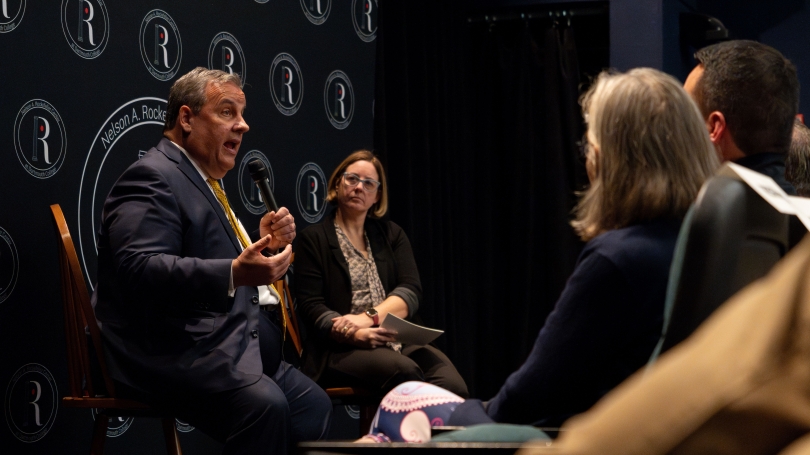
- Public Policy
- Leadership
- Funding
- News & Events
- About the Center
Back to Top Nav
Back to Top Nav
Back to Top Nav
Back to Top Nav
On Thursday, November 2, 2023 The Rockefeller Center hosted former New Jersey Governor Chris Christie as a part of its Path to the Presidency series. Governor Christie addressed Dartmouth faculty and students as well as Upper Valley residents in the Loew Auditorium at the Black Visual Arts Center.
The event was co-sponsored by the Dartmouth Political Union and consisted of remarks from Christie followed by a moderated Q&A with Government Professor Anna Mahoney who serves as Executive Director of The Rockefeller Center.
Christie began by emphasizing a need for leadership in an increasingly conflicted global landscape.
"It is an extraordinarily dangerous time in the world," Christie said. "I think that it's time in this country for us to have serious people once again to be president of the United States.
In his words, the most important consideration in choosing a president is "character" which he defined as crucial for "whether we come through a crisis successfully or not." Christie alluded to former President Trump as a "TV tough guy" who is not prepared to be president and gives "easy answers to difficult questions." He added that it is not possible to ask a candidate every question that they will face as president, pointing out that no one could have asked President Bush about 9/11 or Trump about COVID-19.
Focusing on Trump, Christie said that other Republican primary candidates have been afraid to criticize Trump. He cited their aversion as motivation for his entrance into the presidential race, joking that the other candidates treat Trump like "Voldemort" because they are "unwilling to even say his name."
Turning to international affairs, Christie labeled a "foursome of evil" as the greatest threat to America from abroad. According to Christie, these four countries are Iran, North Korea, China, and Russia and seek to create a global "vacuum of leadership" by weakening the United States. Pointing to specific examples, Christie said that China is funding Russia's war against Ukraine, Russia is obtaining missile technology from North Korea and drone technology from Iran, and Iran is funding Hamas and Hezbollah in the Middle East.
Christie declared the solution to the "foursome of evil" to be "showing strength" and pointed to his strong support of Ukraine and President Volodymyr Zelenskyy. He noted that America has given Ukraine 5% of the Pentagon's yearly budget, and in return they have degraded 50% of Russian military hardware.
"Seems like a pretty good return of investment on a promise that we have already made," Christie said.
Christie added that by defending Ukraine, America "shows the Russians and the Chinese that if they invade one of our friends that we will be there to help them."
Turning to the Israel-Hamas war, Christie said Israel was at fault for military failures but is still "our greatest ally and only democracy in the Middle East." He labeled three actions that Israel should take to defend itself: protecting territorial integrity and safety of their people, taking actions to degrade Hamas' ability to ever strike back again, and remembering that the real enemy is Iran.
Christie closed his remarks by discussing domestic protection of democratic principles. He referred to a speech he delivered at an African American Baptist Church in South Carolina two weeks prior about the importance of treating people with love and respect.
"We live in the greatest country in the world, in the greatest neighborhood in the world, unless we decide to ruin it," Christie quoted himself.
Speaking directly to college students, Christie asserted the importance of protecting free speech, which he defined as "conditioned upon respect." He added that violent speech should not be protected, but in an academic environment, "agreement and disagreement should sound the same."
In the moderated Q&A, Christie fielded questions about New Hampshire's first-in-the-nation status, his deficit plans, and the direction of the Republican Party.
By Varun Swaminathan '26, Rockefeller Center Student Assistant for Public Programs